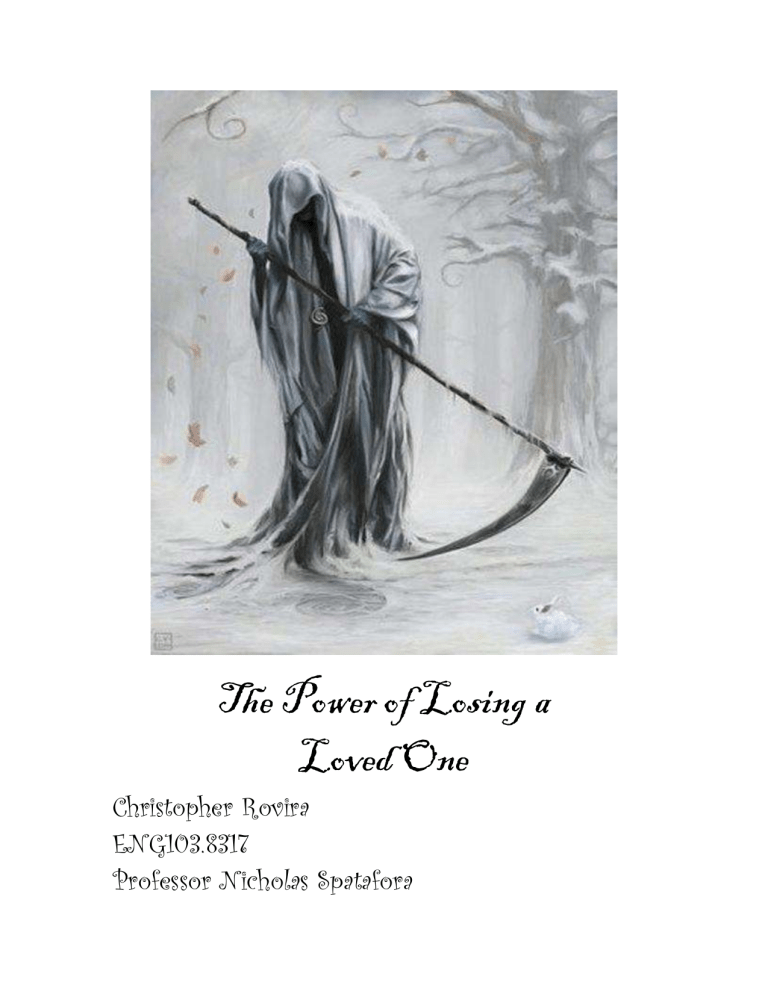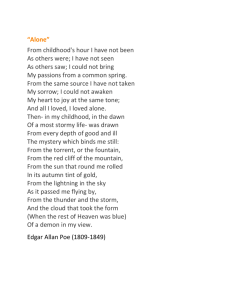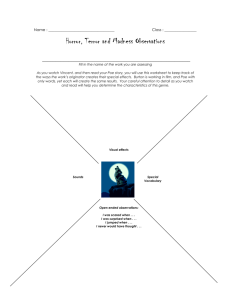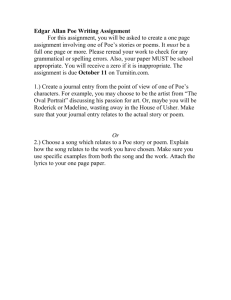The Power of Losing a Loved One Christopher Rovira ENG103.8317

The Power of Losing a
Loved One
Christopher Rovira
ENG103.8317
Professor Nicholas Spatafora
Christopher Rovira
ENG103.8317
Professor Spatafora
07/20/09
The Power of Losing a Loved One
Death is a natural process that occurs on a regular basis. Even as we speak, there are people dying somewhere around the world. In general, most people wouldn’t care for a second that a person whom they never met died in an accident. However, when tragedy befalls a loved one or significant other, a different reaction is displayed. Losing a person dear to you can lead people down a destructive path. Depression, anxiety, alcoholism and even suicidal thoughts are possible results stemming from the loss of a cherished individual. As Abby Lynne states, “Grieving is a process that starts at different points for different people after encountering a tragedy. The mental and emotional damage, the suppressed fears, distortions of the mind, all of these things are the post traumatic effects of loss” (Lynne). There are many examples of this happening in our society. The following examples are indications of such a result.
The suffering of E.A. Poe’s wife sent him into a whirlwind of insanity and alcoholism. Another person writes to his mother asking her to come to him so they may die together due to the sorrows they have been subject to. Another man ends up falling into a severe depression once he begins to realize that his fiancée has fallen out of love with him. In a real life situation, I lost a close friend on New Year’s Day 2005. He was stabbed to death out on the street moments after the clock struck midnight. It took me awhile to get over the shock of the revelation that he would not be back. All of these examples will prove that losing a loved one has a powerful effect on the emotional well-
being of people.
E.A. Poe loved his wife with such a passion that he claims, “She was a person whom I loved as no man ever loved before” (Poe 8). The love of a spouse can sometimes be unparalleled. These are the people whom you spend your life with. You start a family with them, live and grow old together. You make love with them, and are with them in times of happiness and times of hardship. As in marriage vows, you are intended to be together until death do you part. If something devastating happens to your life partner: whether its husband or wife, you can bet that it is not going to be a pretty picture.
Poe’s wife tragically ruptured a blood vessel while she was singing. To Poe, it was as she already died. Poe states, “Her life was despaired of. I took leave of her forever and underwent the agonies of her death” (Poe 8). As Poe makes it clear, it is as he is dying himself. His wife’s pain is also his own. There were times when it had seemed she was close to being cured but it was to no avail. She ended up breaking the same vessel over and over again. This process went on several times throughout the years. This led Poe to fits of insanity. He became a drunkard, not even realizing how much alcohol he ended up consuming. He had lost the hope of finding a permanent cure for her illness.
His solace finally arrived with the death of his wife. He states on her death, “I can and do endure… it was the never-ending oscillation between hope and despair which I could not longer endure.” Poe was finally relieved of his hardship once his wife left the mortal realm. This proves that the suffering of a loved one can damage a life.
Suicide is a major cause of death in the United States of America. Over 33,000
Americans take their own lives every year. It is believed that a person commits suicide once every 16 minutes (American Foundation for Suicide Prevention). Every day,
approximately 90 Americans kill themselves (AFSP). Suicide may result from a number of different scenarios. Death of a loved one, illness, even a break-up can make even a seemingly normal person want to end their lives in an instant.
One man writes to his mother asking for her to rush to his home. The reason for this homecoming was so they could die together. The man was very ill, noting that he has
“had the cholera, or spasms quite as bad” (11). He lost all reason, even stating, “I must die” (11). The reason for his suicidal thoughts stemmed from a woman in his life named
Virginia. This woman, directly or indirectly caused this man to go insane. He believes, “I was never really insane, except on occasions where my heart was touched.” He went to prison for his alcoholism, due to Virginia. It seems that Virginia had done him wrong sometime in the past and he was still feeling damaged from it. Relationship problems have been shown to cause suicidal thoughts and can make people violent time and time again. The effect of this loss of a significant other also supports the notion of a powerful effect on one’s emotional state.
Depression is defined as an illness that involves the body, mood, and thoughts, that affects the way a person eats and sleeps, the way one feels about oneself, and the way one thinks about things (MedicineNet). People with a depressive disease cannot merely "pull themselves together" and get better. Without treatment, symptoms can last for weeks, months, or years. Over 60 percent of all people who die by suicide suffer from major depression (AFSP). Depression can also be caused from relationship disputes, death and abandonment, among other things.
The loss of a relationship is another factor that may contribute to depression. One man gave up his apartment and moved into his former fiancée’s apartment. It was already obvious there were problems between the two when the man states, “Perhaps there was still a chance, I thought, and despite the advice of family and friends, I moved in October
1” (Spatafora vii). Even the man’s family could see this would only result in heartbreak.
His love was blind – still hoping for something even though she complained about him on a daily basis. In only a month, the man ends up slipping into a depression. He begged and pleaded with the woman for another chance at love, but she did not budge. When he was finally kicked out, he was still wallowing in his own delusions, believing that there was a “glimmer of hope” (Spatafora vii). Eventually, he realizes that no hope exists and the following three years he sinks into a great depression. He describes the pain as
“unbearable.” Losing a loved one had led him to destruction, further exemplifying that the loss of a dear acquaintance can be explosive.
People are murdered over foolish things. It can happen because of money, it can happen because of love. It might even happen if you look at a person the wrong way. The effects of being murdered does not limit to the person that it happens to. It is also felt by the people close to the victim. Family, friends and acquaintances all can feel the devastating impact of someone being murdered. Over 16,000 people were murdered in the United States in 2005. That means that at least 16,000 people lost someone important to them. I was one of those people that lost someone important.
It happened on New Year’s Day 2005. It was moments after the clock struck midnight. I was home spending the night with my family. I received a call at about 1 in the morning. I thought it was a call with good wishes for the New Year. Unfortunately it was nothing of the sort. It was a friend of mine, calling me to say that a close friend of ours, Charlie Velez, had been stabbed outside of a party just minutes after midnight. At first I thought it was some crazy joke, but once I heard my friend crying on the other end of the phone I figured it was no laughing matter. He told me he saw the whole thing. A man had called him outside because he was being “disrespected.” While Charlie’s back was turned, he pulled out a knife and stabbed him several times in the back, and then in the chest. I was utterly shocked once I heard this; I dropped my phone out of disbelief. I went to sleep that night dumbfounded, hoping for good news later in the morning. The good news I had been hoping for never came.
On January 2, 2005, a copy of a local newspaper was brought to me. I glanced at the front page: Charlie Velez, 19, first casualty of 2005. It read that he died as his ambulance arrived at the hospital. I couldn’t believe it. It felt like a part of me had disappeared. We had been close friends ever since I moved to the neighborhood 10 years before the incident. It was unfathomable to me that he was gone from this world forever.
I had trouble sleeping the nights following the horrific event. Weeks went by and the realization was still too painful that he was not coming back. Eventually I have gotten over the worst of it, but sometimes the memories of him float back to me on occasion and it still feels agonizing. Every year, during his birthday and that fateful day, we gather around the corner of my block and light up candles for him. It is the least we can do in honoring a great person. As you can see, the death of a close friend can cause great
emotional pain.
In conclusion, it has been proven that the loss of someone: whether by death or other means, can negatively impact a person’s emotional state. The suffering of E.A.
Poe’s wife took a toll on him, resulting in insanity and alcoholism. The man who wrote his mother claimed he had nothing to live for and wanted to die all because of a woman named Virginia. By blindly loving his former fiancée, one man slipped into a terrible depression, leading his family and friends to fear for his life. The loss of my friend
Charlie had caused me to feel anguish and distress for weeks. Had tragedy not befallen these men; including myself, these negative effects might not have occurred. The result of losing a loved one does indeed have a powerful negative impact on an individual’s existence.




